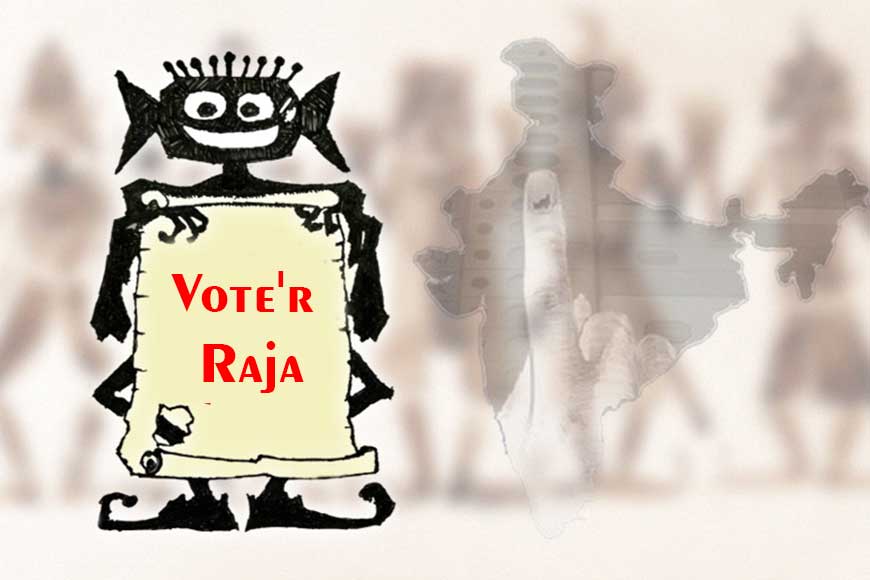Blessings from the king of elections

It is not uncommon for leaders belonging to various political parties to think of themselves as royalty every time elections roll around. It is perhaps not entirely unjustified either. Because once the votes have been counted, many among them become arbiters of the destinies of millions, either at the Centre or in various states. Which is perhaps why they cannot help coating themselves in a regal aura as soon as elections are announced.
An invisible entity, really, like the character of Raja in Rabindranath Tagore’s play ‘Raktakarabi’. The senior ECI officials we can see are, in fact, merely at various levels of subordination, all of them representing the invisible king.
However, our great Constitution decrees that from the day elections are announced to the time results are declared, the real star of the show is the Election Commission of India (ECI). This is an institution acknowledged by the Constitution, which means it has perpetual life. It can never be abolished. Perhaps an example would make things simpler. When a national Emergency was declared in 1975, many institutions such as the Press Council were forced to shut shop, because none of them were Constitutional in nature. Even under those circumstances, however, the ECI remained unscathed.
Last Saturday, at a rally in Haripal in Hooghly district, the honourable Narendra Modi said that the first thing the BJP government in the state will do is to implement the PM Kisan Prakalp, and he claimed that he has already asked state officials to keep the relevant papers ready. While he can make any number of promises he wants at an election rally, he has no authority to issue instructions to state government employees, since the Model Code of Conduct (MCC) is in force.
Who or what is the principal driving force behind the ECI? An invisible entity, really, like the character of Raja in Rabindranath Tagore’s play ‘Raktakarabi’. The senior ECI officials we can see are, in fact, merely at various levels of subordination, all of them representing the invisible king. Their principal attribute is that they can hear every order of the king, but none of the complaints made by the likes of Nandini or Bishu Pagol, two other characters from the play.
But enough of the literary allusions. Talking about the ongoing elections in five states and Union Territories, I would like to mention two incidents. An EVM (electronic voting machine) was found in the car of a BJP leader in Assam. And in our own state, at a booth in Nandigram, no matter which button a voter pressed, the vote went to the BJP. In the case of Assam, a few junior ECI officials were penalised - the bigger fish went free. The leader whose car produced the EVM walked free too. Actually, the ECI seems to be a firm believer in self-purification, so the heads that roll belong to lowly minions. As for Nandigram, that complaint was dismissed at the very outset.
Following these incidents, the head of the commission issued a diktat to preserve the sanctity of the voting process. Under normal circumstances, once voting is over, all ballot boxes and EVMs are sent to a strong room in the presence of representatives from all contesting parties. While that has happened this time, what’s new is that before counting begins, commission observers will enter the strong rooms to match the votes recorded by the EVM with the VVPATs. No representative of any political party will be present at this time, though if such a decision has been made at an all-party meeting, we are yet to hear of it. This is of crucial importance in a country like India, where the average citizen knows next to nothing about EVM technology. Political representatives must be present when the strong room is opened, too, as happens during counting.
Talking about the ongoing elections in five states and Union Territories, I would like to mention two incidents. An EVM (electronic voting machine) was found in the car of a BJP leader in Assam. And in our own state, at a booth in Nandigram, no matter which button a voter pressed, the vote went to the BJP. In the case of Assam, a few junior ECI officials were penalised - the bigger fish went free.
The second incident is even more sensational, since it involves none other than the Prime Minister himself. Last Saturday, at a rally in Haripal in Hooghly district, the honourable Narendra Modi said that the first thing the BJP government in the state will do is to implement the PM Kisan Prakalp, and he claimed that he has already asked state officials to keep the relevant papers ready. While he can make any number of promises he wants at an election rally, he has no authority to issue instructions to state government employees, since the Model Code of Conduct (MCC) is in force. The thing is, Modi has fallen into a bad habit. Ever since he has taken over as PM, the ECI has been declaring election schedules only once he has run through his entire list of promises. There has been no exception this time, either. However, he is still nobody to issue instructions during an election campaign.
And yet, the ECI is completely silent about this major breach of the MCC. as long as no formal complaint is lodged, the commission plays deaf. Even when a complaint is lodged, the ECI ascertains what the king wished to do about it, the Bengal Vidhan Sabha elections of 1972 is a shining example. Comparing the results of 1971 and 1972, it becomes glaringly obvious that chief election officer Senbarma was a complete puppet in the hands of Indira Gandhi and Siddhartha Shankar Ray. Big chief Shyamlal Shakhder performed a similar role in Assam in 1983. These chiefs understand all the king’s wishes at the right time. Democracy can go to the dogs, they couldn’t care less.










